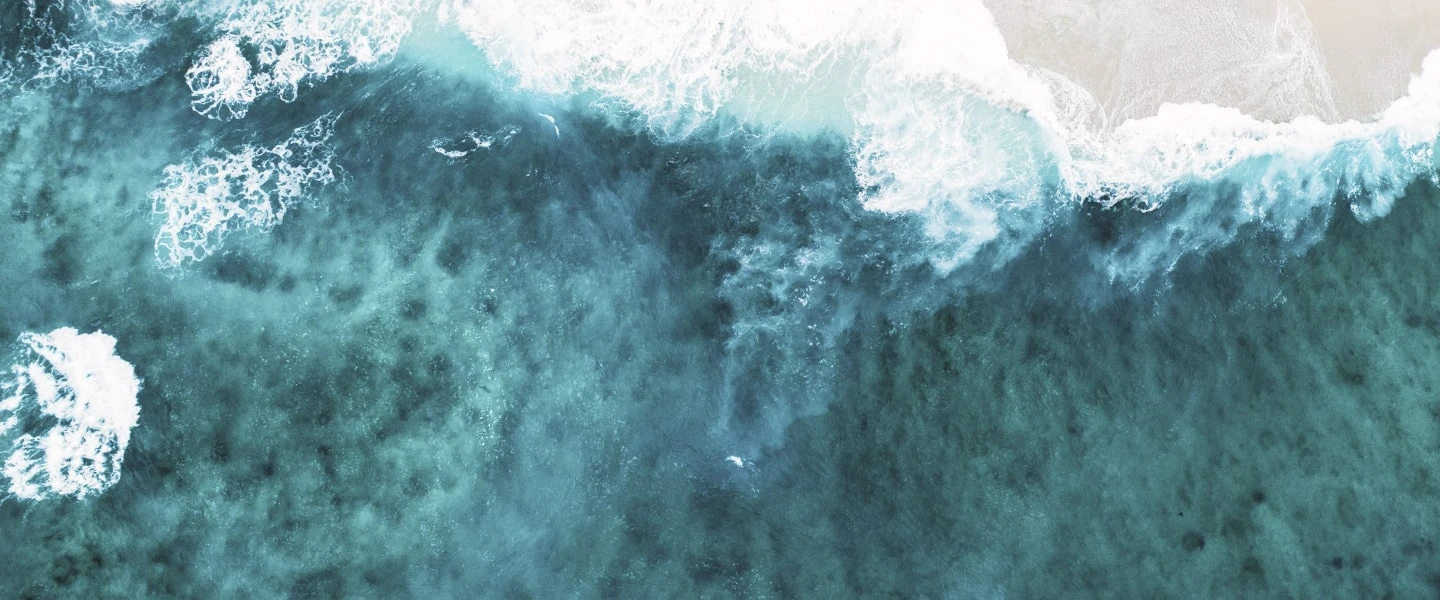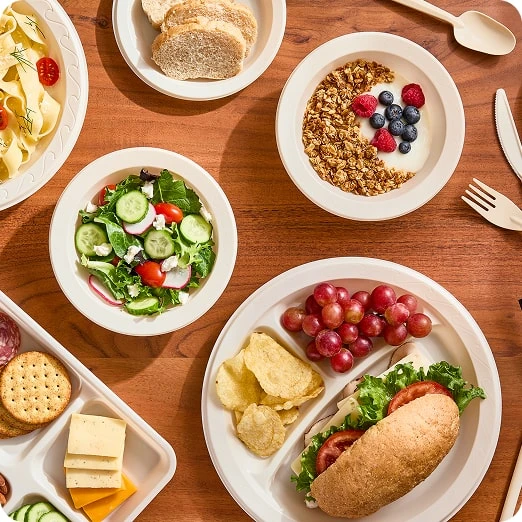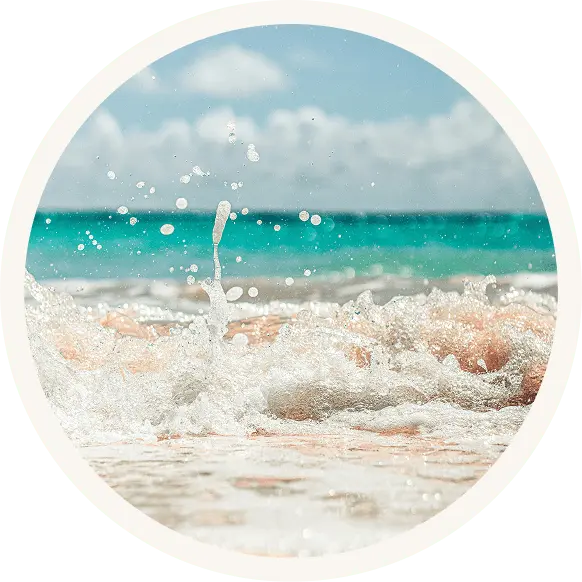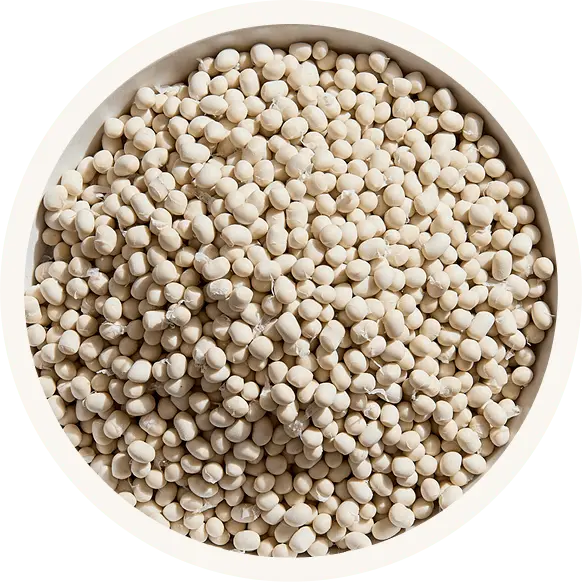
Setting new standards in sustainability.
A fresh perspective.
Every year, more than 11 million metric tons of plastic enter our oceans—polluting ecosystems, harming marine life, and impacting human health. As it breaks down, it forms microplastics: tiny particles that have been found in our food, water, air, and even our bloodstreams.
What began as a packaging problem is now a global health concern, and if nothing changes, plastic pollution is expected to triple by 2040.
We're committed to reversing the trend.

Raw, naturally renewable ocean calcium sand is 96-98% pure calcium carbonate.
Our circular bioeconomy
Wave Ware™ is made with Ocean Calcium Sand—a renewable material that supports a circular bioeconomy by replacing fossil-based resources with naturally renewing ones.
Sustainably sourced from the sea.
Unlike traditional mineral fillers that are mined from non-renewable sources, Wave Ware is made with oolitic aragonite—a type of Ocean Calcium Sand formed naturally in shallow tropical seas. These tiny, smooth, egg-shaped grains are precipitated by photosynthetic cyanobacteria, which actively remove carbon dioxide from the atmosphere during formation—making our products not just renewable, but carbon negative from the start.

Responsibly produced for the planet.
At our facility in Alabama, harvested Ocean Calcium Sand is milled to a fine, consistent texture, formed into pellets, and transformed into Wave Ware through certified, low-impact manufacturing. Proudly Made in the USA, every step of our process is designed to minimize environmental impact, avoid harsh chemicals and fossil-derived additives, and support a domestic circular supply chain that’s better for the planet.

Naturally returns to enrich the soil.
When its job is done, Wave Ware doesn’t linger in landfills or float in the ocean. It breaks down, composting into nutrient-rich soil. Aragonite contains bioavailable calcium that enhances compost, improves soil health, and boosts crop yields. By returning to the earth as a plant-friendly resource, Wave Ware continues to benefit the planet long after its final use—closing the loop on sustainability.





Not all biodegradables are created equal.
Not all biodegradable products live up to their promise. In fact, some "biodegradable" products can take years—or even centuries—to break down, often leaving behind harmful residues. In contrast, compostable packaging, under the right conditions, reliably decomposes within 6-12 months into non-toxic, nutrient-rich compost that enhances soil health.
Verified and validated.
-
ASTM D6400
-
TÜV AUSTRIA Belgium (Clear Straws)
-
BPI (Black and Natural Straws)
Frequently asked questions.
Your guide to sustainable food service solutions.
Ocean Calcium Sand is naturally occurring calcium carbonate (CaCO₃) that's abundant in our oceans. What sets it apart is its negative carbon footprint – meaning it actually removes CO₂ from the atmosphere during production. This sustainable and renewable material forms the foundation of our eco-friendly products, helping your business reduce its environmental impact while maintaining premium quality.
Home compostable packaging is designed to break down in a backyard compost bin or home composting system. It decomposes naturally with the help of microbes at lower temperatures, typically taking a few months to a year to fully degrade. Since it leaves no toxic residue, it’s safe for home gardens and personal composting setups.
Commercially compostable packaging requires industrial composting facilities, which provide high temperatures, controlled humidity, and specialized microorganisms to speed up the decomposition process. It typically breaks down within weeks under these optimal conditions. Unlike home compostable packaging, commercially compostable materials may not fully degrade in backyard compost bins, making it necessary to send them to a composting facility for proper processing.
Absolutely! We believe in transparency and accountability:
BPI Certified: Our Natural and Black Ocean Calcium Straws
TÜV AUSTRIA Belgium Certified: Our Clear Straws
Certified Materials: All thermoform products use certified compostable materials
Third-party certifications like BPI and TÜV AUSTRIA provide credibility and peace of mind for you and your customers. They verify that our products meet rigorous scientific standards for compostability, so you can confidently market them as truly sustainable alternatives. Plus, certified logos on packaging help communicate your environmental commitment to eco-conscious customers.
The Biodegradable Products Institute (BPI) is the gold standard for compostable products in North America. BPI certification means our products have undergone extensive testing and will completely break down into nutrient-rich soil in industrial composting facilities – without leaving toxic residues behind.
Currently, our minimum order is one pallet per size, color, material, and item code. However, we're launching an e-commerce platform soon that will allow smaller case quantities – perfect for growing businesses testing sustainable alternatives.
Our e-commerce platform is launching soon! This will make ordering more convenient and accessible for businesses of all sizes. Check back regularly for updates.
Yes! We understand that branding matters in the hospitality industry:
Custom Wrapper Options:
2-color design: 2–3 weeks lead time after artwork approval
4-color design: 8–10 weeks lead time after artwork approval
Minimum quantities and additional charges apply
Logo Integration: Available on thermoform products with custom tooling (prepayment required)
Yes, we can match Pantone colors, though lead times may increase. Please note that due to our sustainable materials, the final color may vary slightly from standard Pantone references – but we'll work with you to get as close as possible.
All Wave Ware products are proudly manufactured in Gadsden, Alabama, USA. This ensures quality control, supports American jobs, and reduces shipping distances for many of our customers.
Pickup: Visit us at 145 Thomas Dr., Gadsden, AL 35904 (appointment may be required)
Delivery: We ship worldwide! We can arrange freight carriers or work with your preferred logistics company to ensure your products arrive safely and on schedule.
Absolutely! We partner with restaurants, hotels, and foodservice companies to create custom compostable solutions that complement your brand and sustainability goals. Our team can help design products that meet your specific needs while maintaining our environmental standards.
Yes! Our sister company, Calcean, has been recognized for its commitment to sustainability with the EcoVadis Bronze Award. Additionally, NantBioRenewables is a finalist for the Sustainability Award by Packaging Europe, with the final event taking place in November 2025 in the Netherlands.
- Life Cycle Assessed – ISO 14044
- Environmental Product Declaration (EPD)
- ASTM D6868
- ISO 14067:2018 Carbon Footprint Analysis
- Biogenic Content
- FDA GRAS
For more information on certifications, Contact Us.
Contact your sales manager to explore custom possibilities and discuss minimums and lead times.